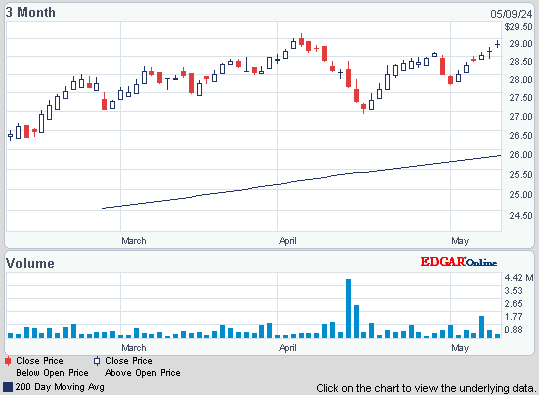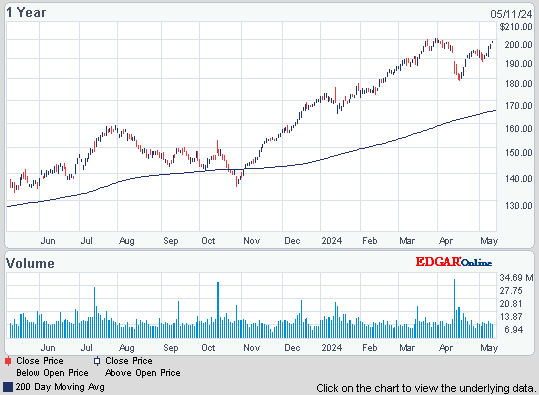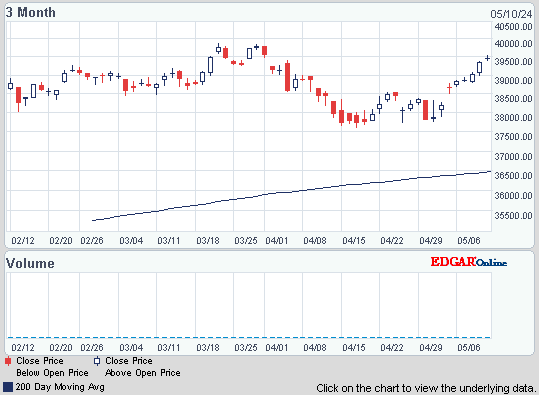Dow rose 34, advancers 4-3 ahead of decliners & NAZ gained a bigger 20. The Financial Index fell 1+ to below 200 (see story below). The MLP index was even at 385 while the REIT index rose 1+ to more than 261. Junk bond funds did little & Treasuries were higher. Oil dropped, heading for a 2nd weekly decline, as China’s industrial output unexpectedly slowed & concern grew that Europe’s debt crisis will worsen & reduce fuel demand. Gold is also sliding lower.


Photo: Bloomberg
Producer prices unexpectedly fell in Apr as energy costs dropped by the most in 6 months, a sign of easing inflation pressures that could give the Federal Reserve (FED) more room to help the economy should growth weaken. The Labor Dept said the PPI dropped 0.2% last month, the first drop of the year & the biggest decline since Oct. Expectations were for prices at farms, factories & refineries to be flat. A rise in gasoline prices last year pinched consumers & fueled higher inflation, but the FED has maintained that the spike would be temporary. Still, the annual inflation rate targeted by the FED continues to hover around its 2% goal & the price data did not appear to change views on the outlook for monetary policy. The report showed wholesale prices 1.9% higher in Apr than a year earlier, the weakest reading since Oct 2009. The drop in PPI was due to a 1.4% decline in energy prices, the biggest drop since Oct . Gasoline costs slumped 1.7% while prices also fell for residential natural gas & liquefied petroleum gas. Wholesale prices excluding volatile food & energy costs rose in line with expectations, up 0.2% after the 0.3% gain in Mar. The inflation front is quiet.
Producer Prices U.S. Decrease for First Time in Four Months

Bankia SA, in Madrid
Photo: Bloomberg
Spain has ordered independent audits of its banks' debt loads & will force them to set aside another €30B ($40B) to cover potential losses on real estate. These moves are the gov's latest attempt to restore confidence in a sector that's at the heart of the Spanish economy's slump & fears the country might need a bailout like Greece, Ireland & Portugal. Measures were announced for banks to place their non-performing real estate assets into separate entities, which would then be charged with selling them at market prices. The new money banks will have to set aside will cover loans that are not yet considered problematic but could sour if the recession proves deeper than expected. Until now, the gov had ordered banks to set aside provisions on loans that had already soured. The biggest fear is that if banks start failing the gov will be overwhelmed by the cost. But saving the Spanish gov could prove too expensive for Europe's bailout funds, threatening the existence of the euro currency bloc. Against the expectations of many, the gov did not announce any new loans or aid for Bankia SA, the troubled lender it nationalized this week Bankia holds a an enormous €32B in real estate assets that are considered problematic. Spain faces one of the toughest moments of its modern history, with the economy in recession & unemployment at nearly 25%. This is getting to be an ugly financial mess.
Spain Stakes Credibility on Fourth Bank Cleanup Attempt
JPMorgan Chase, a Dow stock & the largest bank in the US, lost a whopping $2B in the past 6 weeks in a trading portfolio designed to hedge against risks the company takes with its own money. "The portfolio has proved to be riskier, more volatile and less effective as an economic hedge than we thought," CEO Jamie Dimon said. "There were many errors, sloppiness and bad judgment." The trading loss is an embarrassment for a bank that came through the 2008 financial crisis in much better health than its peers because it kept clear of risky investments that hurt many other banks. The loss came in a portfolio of the complex financial instruments known as derivatives, & in a division of JPM designed to help control its exposure to risk in the financial markets & invest excess money in its treasury. It has been reported that a single trader in London was making such large trades that he was moving prices in the $10T market. Dimon said the losses were "somewhat related" to that story, but seemed to suggest that the problem was broader. Dimon also said the company had "acted too defensively," & should have looked into the division more closely. Can you spell, "Uh-oh?" The stock plunged $3.24 (8%).
JPMorgan Loses $2 Billion on Unit’s ‘Egregious Mistakes’

This could have been a very ugly day after the JPM story, but there was no major selling. Hope springs eternal. The euro mess lumbers on, hard to distinguish which story is the worst. The US economy is doing OK. I give the recovery a grade of C, lower than many others. But stock buyers are not ready to throw in the towel. Dow is still down more than 100 this week, that it could have been a lot worse.

JPMorgan Chase Capital XVI (AMJ)
Treasury yields:
U.S. 3-month | 0.086% | |
U.S. 2-year | 0.258% | |
U.S. 10-year | 1.850% |
| CLM12.NYM | ...Crude Oil Jun 12 | ...95.99 | ... | (1.1%) |
| GCK12.CMX... | Gold May 12 | ....1,586.10 | ... | (0.6%) |
Get the latest daily market update below:

Producer prices unexpectedly fell in Apr as energy costs dropped by the most in 6 months, a sign of easing inflation pressures that could give the Federal Reserve (FED) more room to help the economy should growth weaken. The Labor Dept said the PPI dropped 0.2% last month, the first drop of the year & the biggest decline since Oct. Expectations were for prices at farms, factories & refineries to be flat. A rise in gasoline prices last year pinched consumers & fueled higher inflation, but the FED has maintained that the spike would be temporary. Still, the annual inflation rate targeted by the FED continues to hover around its 2% goal & the price data did not appear to change views on the outlook for monetary policy. The report showed wholesale prices 1.9% higher in Apr than a year earlier, the weakest reading since Oct 2009. The drop in PPI was due to a 1.4% decline in energy prices, the biggest drop since Oct . Gasoline costs slumped 1.7% while prices also fell for residential natural gas & liquefied petroleum gas. Wholesale prices excluding volatile food & energy costs rose in line with expectations, up 0.2% after the 0.3% gain in Mar. The inflation front is quiet.
Producer Prices U.S. Decrease for First Time in Four Months

Photo: Bloomberg
Spain has ordered independent audits of its banks' debt loads & will force them to set aside another €30B ($40B) to cover potential losses on real estate. These moves are the gov's latest attempt to restore confidence in a sector that's at the heart of the Spanish economy's slump & fears the country might need a bailout like Greece, Ireland & Portugal. Measures were announced for banks to place their non-performing real estate assets into separate entities, which would then be charged with selling them at market prices. The new money banks will have to set aside will cover loans that are not yet considered problematic but could sour if the recession proves deeper than expected. Until now, the gov had ordered banks to set aside provisions on loans that had already soured. The biggest fear is that if banks start failing the gov will be overwhelmed by the cost. But saving the Spanish gov could prove too expensive for Europe's bailout funds, threatening the existence of the euro currency bloc. Against the expectations of many, the gov did not announce any new loans or aid for Bankia SA, the troubled lender it nationalized this week Bankia holds a an enormous €32B in real estate assets that are considered problematic. Spain faces one of the toughest moments of its modern history, with the economy in recession & unemployment at nearly 25%. This is getting to be an ugly financial mess.
Spain Stakes Credibility on Fourth Bank Cleanup Attempt
JPMorgan Chase, a Dow stock & the largest bank in the US, lost a whopping $2B in the past 6 weeks in a trading portfolio designed to hedge against risks the company takes with its own money. "The portfolio has proved to be riskier, more volatile and less effective as an economic hedge than we thought," CEO Jamie Dimon said. "There were many errors, sloppiness and bad judgment." The trading loss is an embarrassment for a bank that came through the 2008 financial crisis in much better health than its peers because it kept clear of risky investments that hurt many other banks. The loss came in a portfolio of the complex financial instruments known as derivatives, & in a division of JPM designed to help control its exposure to risk in the financial markets & invest excess money in its treasury. It has been reported that a single trader in London was making such large trades that he was moving prices in the $10T market. Dimon said the losses were "somewhat related" to that story, but seemed to suggest that the problem was broader. Dimon also said the company had "acted too defensively," & should have looked into the division more closely. Can you spell, "Uh-oh?" The stock plunged $3.24 (8%).
JPMorgan Loses $2 Billion on Unit’s ‘Egregious Mistakes’
J P Morgan Chase & Co (JPM)
This could have been a very ugly day after the JPM story, but there was no major selling. Hope springs eternal. The euro mess lumbers on, hard to distinguish which story is the worst. The US economy is doing OK. I give the recovery a grade of C, lower than many others. But stock buyers are not ready to throw in the towel. Dow is still down more than 100 this week, that it could have been a lot worse.
Dow Industrials
Get your favorite symbols' Trend Analysis TODAY!


No comments:
Post a Comment